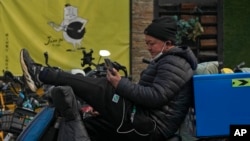China’s official internet regulators are tightening control over unofficial grassroots online activities by blacklisting people who stoke hot social issues to gain followers and holding some platforms responsible for the authenticity of information in their posts.
The target group, so-called self-media, are social media accounts that publish news and information but are not government-run or state-approved. Most of the content released by self-media avoids politically sensitive information.
The Central Cyberspace Administration of China, which was a sub-unit of the official propaganda apparatus, the State Internet Information Office, until 2014, established new regulations on July 5.
Authorities now require the grassroots-level self-media internet platforms to deal promptly with all violations. The regulations cover unofficial media that produce and spread rumors, hype hot social issues, or disseminate what the government deems illegal and harmful information.
Penalties include blacklisting by the Central Cyberspace Administration, which is also authorized to shut down platforms for repeated violations.
“All ‘self-media’ that produce and publish rumors, speculate on social hotspot events, or spread illegal and bad information in a matrix manner that have a bad impact, shall be shut down, included in the platform's blacklist account database, and reported to the Internet Information Department,” according to the regulations. The authorities can also cancel interactive functions.
The new regulations also require self-media to mark the source, shooting time, location, and other relevant information for pictures, videos and related content.
An anti-forgery requirement means self-media accounts must manually review account information that contains the names or logos of the Chinese Communist Party (CCP), the Chinese government and its military agencies, and official news media.
Wei-feng Tzeng, assistant professor at the Graduate Institute of China Studies at Tamkang University in Taiwan, told VOA Mandarin in a telephone interview on Tuesday that this move was triggered by self-media postings during recent accidents and disasters. The authorities worried that the information released by the self-media, especially Internet celebrities, had the potential to cause social unrest, he said.
Authorities believe the new regulations are necessary to strengthen official control of self-media, he added.
"Internet celebrities all ran to film large-scale disasters, such as the gas explosion in Yinchuan earlier this year, police beatings, earthquakes and traffic accidents,” said Tzeng. “They livestream to attract traffic. But for the CCP, it is spreading uncomfortable messages, and the CCP will believe that these messages are incorrect."
Tzeng said people in China tend to accept information from the media without question.
"China is relatively closed. Chinese people feel that this information (on self-media) has been screened by the government and is unlikely to be fake. Relatively speaking, they completely trust the information provided by the media. They are incapable of critical thinking," he said.
Yachi Chiang, president of Taiwan Law and Technology Association, told VOA Mandarin in a telephone interview this week that in the past, accounts belonging to the CCP, government and military organizations, and news media were forged.
"We have also seen that some information seems to be deliberately sent through self-media,” she said. “Why does it target accounts that contain the names or logos of the Party, government and military agencies, news media, and administrative divisions? Don't the authorities already control these accounts?"
This is not the first crackdown on online speech by the Central Cyberspace Administration of China, which is worried about self-media even though the posters don’t cover politically sensitive information, according to Chiang.
"In the past, [posting] these issues that seemed to be related to people's livelihood and relatively irrelevant to politics showed the power of the internet and might lead the direction of public opinion quickly,” she said.
“The authorities would think that the Internet can quickly increase the heat of speech and discussion on some topics they do not want to see. These issues may not seem related to core political issues at first glance, but you can't control people using the internet to discuss topics related to politically sensitive issues in the future," she said.
The Cyberspace Administration claims it is cracking down on self-media that "hypes up hot social events or disseminates illegal and harmful information,” but there are no clear guidelines, which will inevitably have a chilling effect, she added.
"Such unclear standards will cause everyone to panic,” said Chiang.
Tzeng questions whether China’s internet regulators can effectively implement the regulations, even with the assistance of “little pinks” or xiao fenhong, as young super-nationalists are known.
He said, "Although the government claims to have a large-scale internet army, plus many little pinks or internet administrators, now online information flows so fast with so many information sources every day, it is hard to regulate online information by relying only on the government's power. Authorities are now asking online platforms to self-censor first, but the point is, it can't really touch the most grassroots level."




